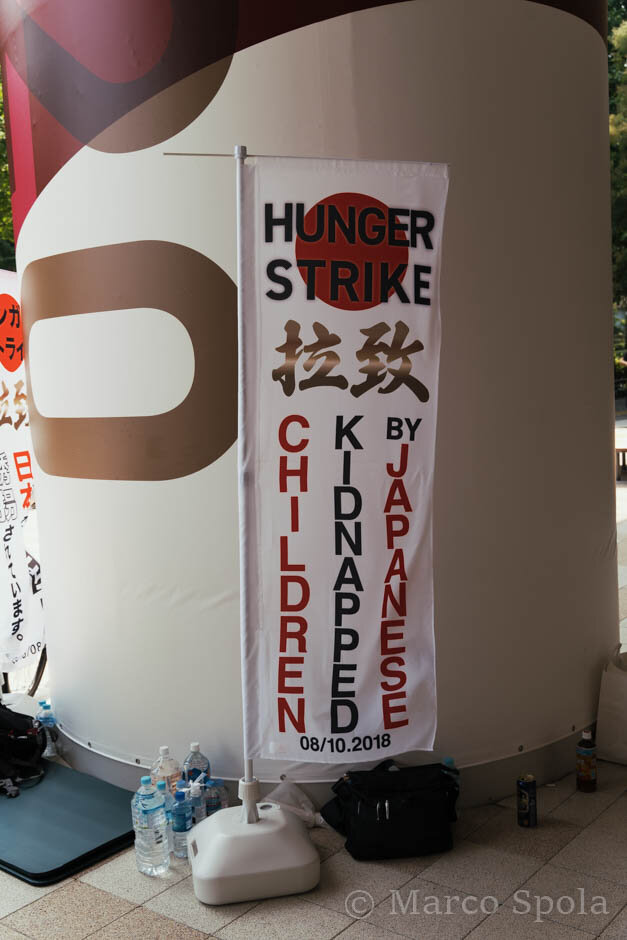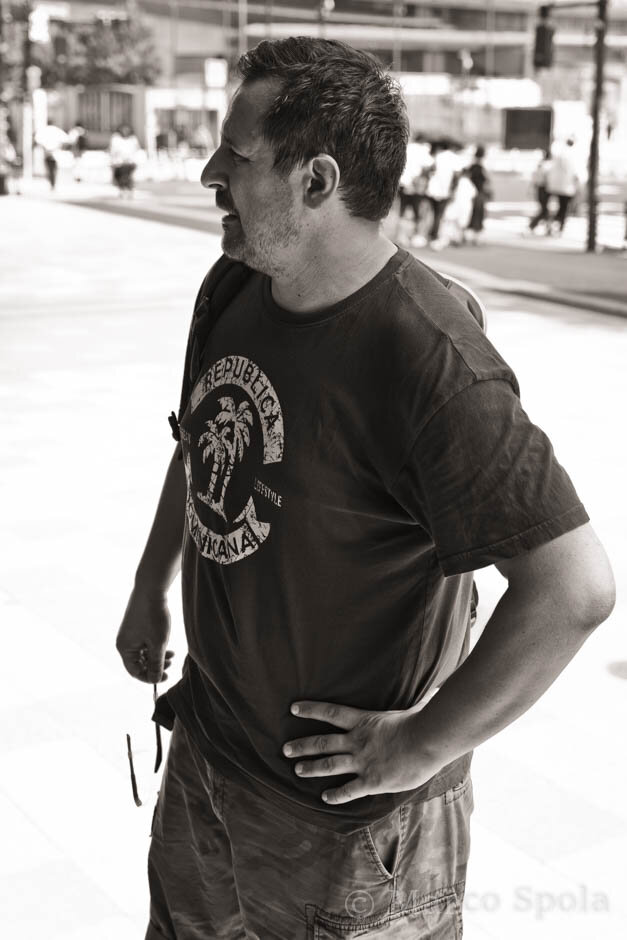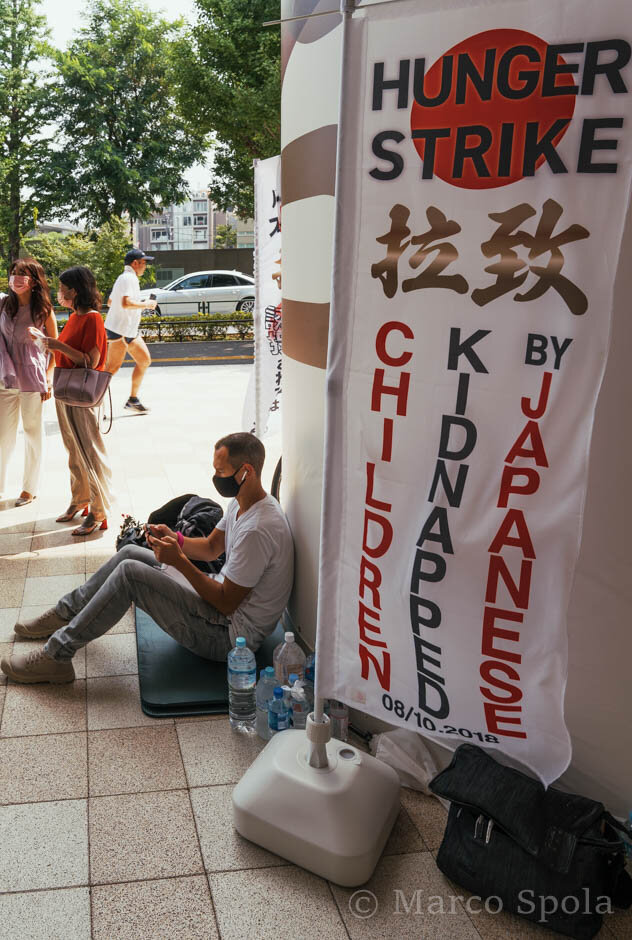Vincent Fichot and his hunger strike to see his children again
Every year in Japan about 150,000 children are abducted by one of their parents, usually the mother, without the father ever being able to see them again. This is what happened to Vincent Fichot (Twitter: @FichotVincent) so after trying every legal avenues for the last three years, he decided to start a hunger strike this Saturday, July 10th. It will last until his children's rights are restored and Japan provides them with reparations according to UN principles. Threats from judges and the Japanese police won't stop him. He will lead this fight in front of the Tokyo stadium for the Olympic Games, which will start on July 23rd.
TOKYO - Despite the fact that Japan is considered a harmonious and balanced country, where everyone respects each other and is extremely kind and peaceful, about 150,000 minors are abducted every year by one of their parents, usually the mother, without the father ever being able to see his children again. It is a medieval justice system that does not break with old traditions, where courts and law enforcement agencies glide by without intervening and politicians ignore pressure from foreign countries, given that Japan signed the UN Treaty on the Rights of the Child in 1994 and the Hague Convention on the Protection of Minors in 2014.
A parallel judicial system, because while by signing all the international agreements Japanese politicians have wanted the world to believe that they are respecting the protocols on human rights, internally they continue to do as they please according to die-hard cultural traditions, ignoring and neglecting the needs of children who remain crushed by this cultural inertia.
Among the victims of this judicial system, in addition to Vincent Fichot, there is also Tommaso Perina, an Italian manager who has been living in Japan since 2003 and who knows the local culture as well as the language. Tommaso did not give up and together with other fathers decided not to mobilising not only the embassies of 26 countries, but also prime ministers and the European Union directly.
Tommaso Perina and VIncent Fichot with their lawyer
What happened to Tommaso is unfortunately a story very common to other fathers who are victims of this system. He falls in love with a Japanese woman, they decide to get married, they have two beautiful children with unique somatic features that combine the beauty of Westerners with the Asian finesse, the mother at some point gets tired and not being able to bear to raise her children in a multicultural environment, she runs away with the children, usually at their parents' home. At this point the father is literally excluded, defenceless, he can never see his children again, the court and the police forbid him to look for them or even to phone them. All relations with the children are literally wiped out, the children will never see their father again, except a couple of times a year for a few minutes in the presence of a lawyer. It is impossible even to deliver a letter or a birthday present.
In Japan, there is no joint custody and it is considered traumatic to expose children to their biological father if he no longer lives in the home. It is a violent mechanism especially for children, who grow up with the idea that their father has abandoned them. Normally, the mother runs away and asks for a divorce, denouncing domestic violence, often invented but above all never verified by the courts or social services. Divorce is an administrative practice and everything is often validated without going through a judge or a court to verify the facts.
Tommaso's battle has seen the intervention of the President of the Republic, Mattarella, the Prime Minister, Conte, and the then Minister for the Family, Fontana, who have put pressure on the Abe government with great support from the Italian embassy in Tokyo. Ambassador Giorgio Starace has taken particular interest in this drama, which currently affects about 20 Italian parents, almost all of them fathers, and about 30 Italian-Japanese minors. In addition, 26 European embassies protested in March 2018 against the Japanese Minister of Justice, calling on Japan to respect the CRC and Hague treaties and, even more so, the rule of law, since civil judgments handed down by family courts are often not respected in Japan.
In addition to our embassy, the French embassy is particularly active on this issue. President Macron raised the issue directly with Prime Minister Abe during the G20 in Osaka in 2019, who cut the matter short by passing it on to the Ministry of Justice, so no dice.
Among the many French fathers who are victims of this drama is Vincent Fichot with an equally dramatic situation. One day in 2018, he came home and found no one. He looked at the security camera and saw his wife hiding the children in the trunk of the car, covering them with a blanket and running away, like a thief. He has not seen the children since that day and various legal attempts to see them again have ended in a police warning that if he went any further they would have to take action against him.
Struck by this sense of impotence, Tommaso and Vincent decided to take on their drama and that of dozens of other fathers, starting a tough battle to raise awareness of this drama that Japan has tried to keep hidden for too many years. Unfortunately, many other fathers have given up, partly because they are alone and far from home, partly because they are devastated by the pain, sometimes for economic reasons, but above all because it is not easy for a foreigner to shake the presumption that the Japanese sometimes display.
Last February 2020, Tommaso and Vincent presented a petition to the European Union requesting that the historic free trade agreement between the two countries, the EPA, be revoked on the grounds that Japan does not respect human rights agreements and does not apply the rule of law, two fundamental factors underlying the EPA economic treaty. Another request was for embassies to provide clear information on the subject through their websites, warning citizens who wanted to venture into such an experience. Thirdly, the request to introduce a visa fee for Japanese citizens travelling to the EU.
On 8 July 2020, an important step forward was taken: the European Parliament voted in favour of the resolution that sends a strong warning to Japan, asking it to commit itself promptly to solving this tragedy involving thousands of European children.
As proof of the fact that the issue is totally ignored, Japan does not record the cases of disputed children, so the figures are very uncertain. One reliable figure seems to be that 150,000 children are abducted from one of their parents every year, but Senator Yukiko Kada claims many more, even more than 210,000. All these cases end in an administrative divorce due to domestic violence and the case is normally closed without any verification.
Now, either the cases of violence are real and then the government should intervene because the problem would be very serious, or the cases of violence are invented and then the government should intervene on this lightness, always to the detriment of children and a parent. We are faced with the usual Japanese response to complicated cases (Covid teaches): if you cannot convince, you confuse.
However, the European Union should reflect and question itself deeply not only on this issue of abducted children. In order to establish trade alliances such as the EPA, which guarantees free trade in goods between the two countries, it is important that there are boundary conditions on human rights shared by both sides. As a reason for its commitment to defending human rights, the European Union is the biggest donor in the fight against the death penalty in the world, but it has signed an alliance with a country like Japan where hanging is still practised.
The Japanese system considers kidnapping and divorce a private matter to be solved at home. There is no concept of family, even less of an extended family, and this cultural legacy has serious consequences for children, who believe they have been rejected by a parent. In 2018, the highest suicide rate was recorded among young people, who are often victims of bullying and loneliness. Surely we are facing a different society than ours, but while the culture may be different, a child's heart is the same everywhere in the world.






